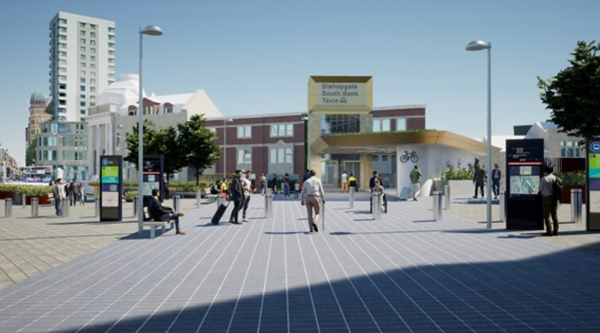Transforming Leeds City train station, work begins




The next stage in the transformation of Leeds City Rail Station’s main entrance and surrounding area will begin this month.
The Leeds Station Sustainable Travel Gateway scheme will create a much-improved and more people-friendly environment which can accommodate growing rail passenger numbers, and ensure people can enter and exit the station safely.
A total of £46.1 million is being invested in the scheme, which is being delivered by Leeds City Council on behalf of Network Rail as the landowner, and in partnership with the West Yorkshire Combined Authority.
Advance works and preparations have been underway since last May, and major improvement work from early March will include:
Pedestrianising New Station Street, including the section which meets Boar Lane, with outdoor seating and rest areas, and landscaping.
Relocating the existing taxi rank to Bishopgate Street where there will be a large and well-lit shelter and room for six vehicles, also allowing for kerb-side boarding which will help people with wheelchairs or assistance dogs to board more easily.
Two 21-passenger lifts from Bishopgate Street to the station entrance on New Station Street, providing step-free access between the two streets.
A high quality cycle hub at the station, which will include electric charging points and storage for all types of cycles.
Environmental improvements to Neville Street and Dark Neville Street including enhanced lighting, road surface and pavement and elevation treatments.
Installing high quality cycle infrastructure on Bishopgate Street and Neville Street, and improvements to cycling infrastructure in surrounding communities.
Since securing planning permission for the scheme, Leeds City Council and Network Rail have been working together to combine the Sustainable Travel Gateway scheme with a separate project which will see Network Rail reinforce the underground structure below New Station Street which supports much of the station above it.
Delivering the two schemes in tandem will mean less disruption in the long-term and also reduces the need to revisit the Sustainable Travel Gateway scheme at a later date if further works are required as part of Network Rail’s scheme.
What’s next
Since securing planning permission for the scheme, Leeds City Council and Network Rail have been working together to combine the Sustainable Travel Gateway scheme with a separate project which will see Network Rail carry out essential structural maintenance works to reinforce the bridge structure below New Station Street which supports much of the station approach road above it.
Delivering the two schemes in tandem will mean less disruption in the long-term and also reduces the need to revisit the Sustainable Travel Gateway scheme at a later date when further station enhancement works are undertaken by Network Rail.
In May, as part of Network Rail’s scheme the taxi rank will be moving to Princes Square. Network Rail are currently liaising with private hire and hackney carriage services with details of the arrangements.
May will also see the northern section of New Station Street from the station’s main entrance towards City Square will be closed to vehicles (except service vehicles and emergency services) and pedestrians to allow paving works to be carried out. Pedestrians will still be able to walk towards Boar Lane from the main entrance, or use the station’s northern entrance.
The full programme of improvements including the Sustainable Travel Gateway Scheme and the Network Rail works is due to be completed by September 2025. Updates will be published at https://leedscitystation.commonplace.is/
Cllr James Lewis, Leader of Leeds City Council, said: “We are delighted to begin these improvements in earnest, creating a gateway to our city that meets the current and future needs of everyone who uses the station.
“Our railway station plays a key role in the North of England’s rail connectivity, so it is vital that we provide a much better experience and capacity for station users as we prepare to welcome further investment in our region’s rail network including the Transpennine Route Upgrade and Northern Powerhouse Rail.”
Cllr Helen Hayden, Leeds City Council’s executive member for infrastructure and climate, said: “These works complement our ongoing transformation of City Square and will create a safer and people-friendly environment, not only improving access to the station but also building better links between the existing city centre and the wider South Bank.”
Tracy Brabin, Mayor of West Yorkshire, said: “Leeds City Rail Station is one of the busiest in the country - it’s a gateway to a vibrant city, as well as many destinations across our region and beyond.
“Growing our economy, connecting more people with opportunities and tackling the climate emergency are at the heart of making West Yorkshire an even better place to live and work, and these improvements are key to that.”
Matt Rice, North and East Route Director for Network Rail, said: “It is fantastic to see that the next stage of this transformation to the front of Leeds station will get underway next month, and we are pleased to be working in partnership with Leeds City Council and the West Yorkshire Combined Authority on this scheme.
“There is a huge amount of investment going into the railway both in Leeds and across the whole of the North at the moment, this scheme included. Transforming Leeds station with accessibility improvements and a better cycling infrastructure will be great for everyone who uses the station, and delivering the two schemes together will reduce any impact on passengers.”
The works are being delivered through the Combined Authority’s Transforming Cities Fund programme, which is aimed at making it easier for people to walk, cycle and use public transport.
The works are the first stage in the Leeds Integrated Station Masterplan – the vision of Leeds City Council, Network Rail, the Combined Authority and partners to transform the Station into a world class hub at the heart of the UK’s rail network, accommodating current and future demand for rail travel and acting as a catalyst for wider regeneration in the south of the city centre.